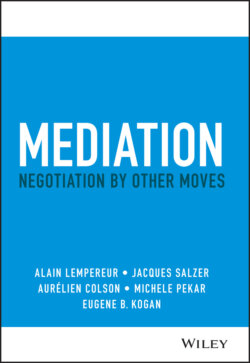Читать книгу Mediation - Alain Lempereur - Страница 41
Is a player offside?
ОглавлениеIn a soccer match, could the two teams discuss, negotiate, or mediate for hours to arrive at a shared decision on whether or not a player is offside? Night would fall on the field without the match continuing. With the support today of video replay, accepting the referee's decision is preferable to guarantee speedy decisions and to resume the match, even if it does not satisfy a particular player or team and feeds the newspaper columns the next day.
Thus, each time the situation demands a form of swiftness in decision‐making – to avoid prolonged blockage, deterioration, even a human disaster – intervention by an authority proves itself essential. This aspect is reinforced in a situation where the decision also involves precise technical, scientific, or legal issues: turning with confidence to a subject matter expert allows everyone to save time.
The fact remains that this preference for speed is carried out to the detriment of other criteria, including the quality of a decision – notably its perceived legitimacy by the involved parties. A prompt decision, without taking time to exchange, inhibits a deep reciprocal understanding, leaves the underlying causes of the conflict intact, does not guarantee that the most appropriate decision will be made, and nor does it prevent the recurrence of conflict. There is, in defense of mediation, a tension between the speed and sustainability of the decision, between immediacy and legitimacy. Mediation, because of its slow and more careful decision‐making style, favors comprehensive conflict resolution. In this spirit, an authority, like a judge, can order an “urgent” mediation, which will make it possible – by immediately taking the useful time of reciprocal explanation – to unfreeze a situation. As long as it is conducted “within a specific timeframe,” this mediation can not only be urgent, but quickly finished, successfully or not. For example, before deciding if the occupation of a factory is legal or not, a judge may order a swift mediation between the parties before making a decision.
What is at play deep down concerning whether or not to resort to mediation is the organization of exchanges. Mediation complements other approaches of conflict intervention by providing an original division of labor. On one side, decision‐making stays with the parties. On the other side, mediators are in charge of the process and the organization of exchanges, allowing parties to concentrate on the problems, without being concerned about “Who is going to talk after whom?” and “Have I been listened to and understood well?” Mediators become like translators from English to English and from feeling to feeling, helping the parties to listen and understand each other, even when there is no particular decision to make. While the mediator focuses on the process, the parties are able to concentrate on their relationship and the problem at hand. The mediator ensures that the process is appropriate to increase the chance of resolution at every moment.
Faced with multiple approaches to third‐party interventions, why choose mediation? The following paragraphs will explore a series of justifications which complement more intuitive criteria, linked to our culture and personal values. Research and experience distinguish between two types of justifications favoring the use of mediation: the first is linked to the past to overcome; the second focuses on a future to (re)construct. Let us examine both.
